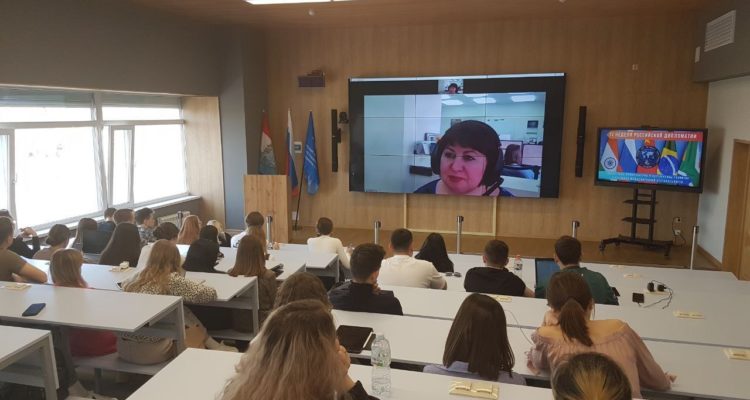On April 12, 2023 was the 3rd day of the “IV Week of Russian Diplomacy”. Today our trainees had an opportunity to get a closer look at the interaction of the BRICS member states in the Latin American region.
Today’s topical speeches were started by leading specialists of “Russia Today” news agency. During her speech, Christina Lyakh, Head of the International Cooperation Directorate of the “Russia Today” news agency, told us about the organization of international projects in the media sphere. She emphasized that it is necessary to respect the cultural specifics of the regions with which cooperation is being conducted. The development of new technologies also plays an important role in this process, which was noted during the report:
“The development of the online sphere has been a good occasion for international communication.”
No doubt, the transition of certain spheres of online life has opened up a wide range of opportunities not only for communication, but also for improving professional skills through distance learning. Dmitry Babich, a columnist for InoSMI, a member of the “Russia Today” media group, emphasized the need for lifelong learning to always “be in trend”.
However, it is important not just to study international relations, but also to communicate with people from other cultures.
“International contacts are not only direct diplomatic contacts, but also cultural, as well as business ties,” Natalia Tyurina, head of the Education and Social Projects Department at the “Russia Today” news agency, emphasized to the students.
Fortunately, students of Samara University have the opportunity to try their hand at building international contacts, as the Primakov Centre regularly hosts various linguocultural events with international participation. Centers with similar activities are open all over the country, which demonstrates their relevance.
“There are no unfriendly countries, there are unfriendly elites,” said Elena Parubochaya, PhD in Historical Sciences, director of the Center for Public Diplomacy at Volgograd State University.
Dmitry Rosenthal, Acting Director of the Institute of Latin America of the Russian Academy of Sciences, delivered the final report for today. He spoke about the most promising forms of Russian-Brazilian cooperation.
It is important that cooperation between the countries has been building up for quite a long time, regardless of the international conjuncture.
“Russia and Brazil have always supported the values of a multipolar world,” emphasized Dmitry Rosenthal.
In general, bilateral cooperation is developing in the economic sphere. We learned that Russia’s agro-industrial sector, fertilizer market, and metal products are in particular demand in Brazil.
Photo: Dariya Yurlova








